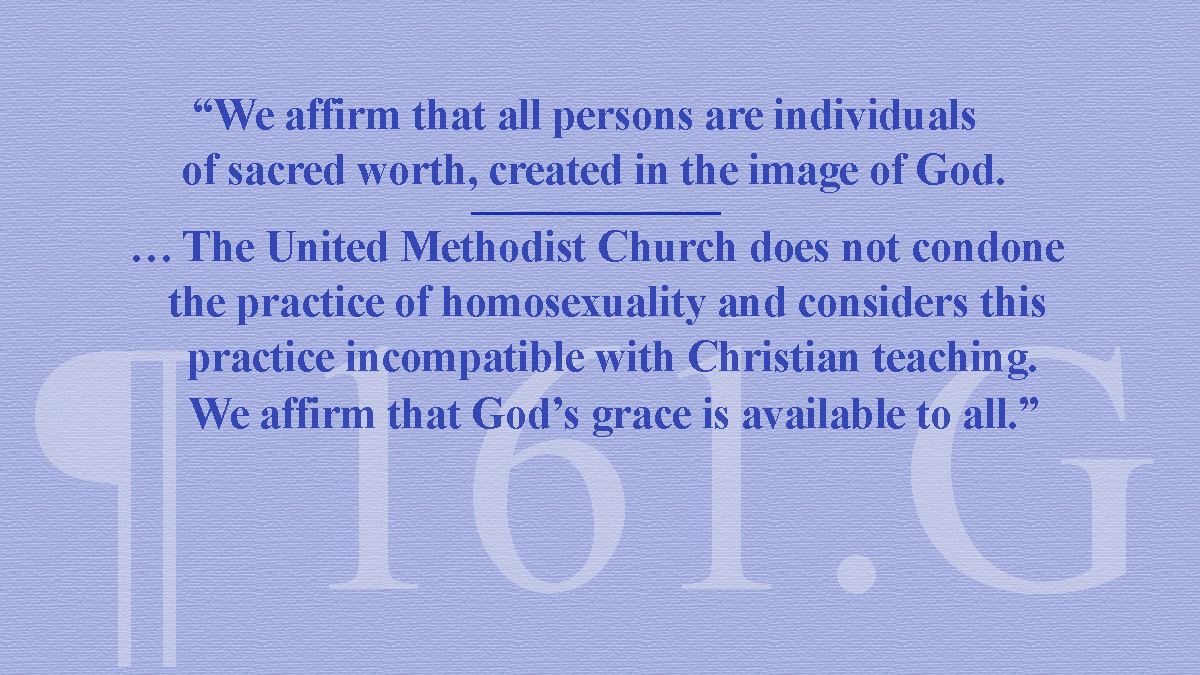 Two excerpts from Paragraph 161.G of the United Methodist Social Principles affirm the sacred worth of individuals and the church’s stance that the practice of homosexuality is incompatible with Christian teaching. Graphic by Laurens Glass, UM News.
Two excerpts from Paragraph 161.G of the United Methodist Social Principles affirm the sacred worth of individuals and the church’s stance that the practice of homosexuality is incompatible with Christian teaching. Graphic by Laurens Glass, UM News.
Two years after a diverse group of United Methodists introduced a proposal for separation, a global pandemic continues to keep the denomination uneasily together.
However, with General Conference scheduled for later this year, preparations are accelerating for the future United Methodist Church and the theologically conservative group that plans to break away. Meanwhile, a theologically progressive group that announced the launch of a new denomination in 2020 is re-evaluating its plans.
Amid all these preparations, long-simmering disputes over LGBTQ inclusion — that led the proposed split in the first place — have started boiling up again.
Council of Bishops President Cynthia Fierro Harvey acknowledged that anxiety is running high for many in the church. She said she often reminds herself of Paul’s advice in Philippians 4:6-7 not to be anxious but to bring prayers and petitions to God.
“We need to navigate this season with love and care for one another and not heap more harm on one another and The United Methodist Church,” she said.
It’s been a busy season. Recent developments include:
- The bishops sharing their vision for the continuing United Methodist Church.
- The North Central Jurisdiction approving a covenant for the future that welcomes and affirms LGBTQ people, and that covenant facing a challenge under church law.
- Iowa Conference leaders facing a backlash after opening the way for same-sex weddings.
- The East Zimbabwe Conference removing its lay leader because of his involvement with an advocacy group.
- Both theological conservatives and progressives making plans for their futures.
Tensions reached a breaking point with the 2019 special General Conference, which, by a vote of 438-384, strengthened bans on same-sex weddings and “self-avowed practicing” gay clergy. The relatively narrow vote did not settle the debate, but instead sparked widespread resistance and hastened discussions of a denominational divorce.
But for the past two years, much of the denomination has been in a holding pattern waiting for action by General Conference — now twice postponed by the pandemic.
The coming legislative assembly faces multiple proposals for division along theological lines. The most endorsed of these is the Protocol of Reconciliation & Grace Through Separation, negotiated by a professional mediator with a theologically diverse group of United Methodists.
Under the proposal, churches and conferences that support restrictions on gay marriage and ordination can vote to leave with church property and $25 million to form a new traditionalist denomination. The protocol also sets aside $2 million for any other new Methodist denominations that form.
The Wesleyan Covenant Association, a theologically conservative advocacy group, has worked toward forming that traditionalist denomination — now named the Global Methodist Church. However, General Conference delegates have the final say on whether the protocol takes effect as written.
The Commission on the General Conference, which organizes the international assembly, expects to decide by the end of March whether the big meeting can go forward as scheduled Aug. 29-Sept. 6 in Minneapolis. The commission is looking at not just delegates’ access to vaccines but also the availability of visas. While visas are an issue for every General Conference, the pandemic has caused more difficulties. The commission has been clear that this coming assembly must have a reasonable level of global participation.
The commission met Jan. 26, mostly in closed session, and did not announce any final decisions about whether General Conference can go forward.
Even with General Conference still up in the air, United Methodists are moving ahead with plans to go in different directions.
In November, the Council of Bishops offered a vision for the continuing United Methodist Church as a big-tent denomination that is rooted in Scripture, centered in Christ and welcoming to all churchgoers — whatever their sexual orientation or theological outlook.
“Our best witness is to love each other as Christ loves us, to show the world the supernatural power of the Holy Spirit to bind us together despite our differences,” the bishops wrote in “A Narrative for the Continuing United Methodist Church.”
Harvey, who also leads the Louisiana Conference, said she sees United Methodist congregations, conferences, agencies and individual followers of Jesus who are already living into the narrative.
“By that I mean, they are being faithful to God’s call to create space and embrace people from the left, the right and the in between,” she said.
